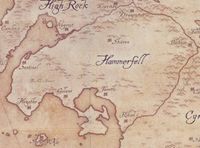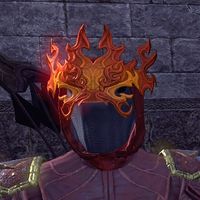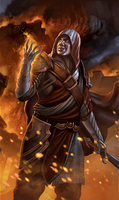Lore:Skaven
| Skaven | |
|---|---|
| Type | Settlement |
| Continent | Tamriel |
| Province | Hammerfell |
| Region | Sunforge |
| Appears in | Arena |
Skaven (also known as Ska'vyn)[1] is one of the eight major cities in the province of Hammerfell,[2] situated in the region of Sunforge in central Hammerfell. In the Third Era, the city was the seat of power for the eponymous Kingdom of Skaven.[UOL 1]
Layout and Geography[edit]
Skaven is found in north-central Hammerfell near the Dragontail Mountains,[3] where old Yokudan traditions continue to flourish by the Crowns.[4] On the northern outskirts of Ska'vyn lies the Caverns of Wry, which contains herds of Skav Bats that are bred to produce dairy by the locals. Their signature Bat Cheese is supposedly paired well with Pomegranate wine.[5] Northwest of the kingdom, across from the Bjoulsae River is the town of Candlemass.[UOL 1] Skaven is neighbored by several settlements, such as Cliff Keep to the east, Heldorn Mount to the northeast, and Verkarth City to the southwest.[2]
Notable Locales[edit]
|
|
History[edit]
Ska'vyn was active since at least the early-mid First Era, when it and the surrounding region was under the tyrannical reign of the unholy city-state, Verkarth and their legion, the Gray Host. The city had reportedly ruled over Hammerfell's east-central region for many years, between Elinhir to the east and Thorstad Place to the west. Their power had drawn the ire of Empress Hestra and her Empire, who took the initiative and moved west for conquest. The Empire had defeated the Gray Host at the gates of the Bangkorai Garrison, with the help of the cleric, Pelin. Ska'vyn was liberated from the vampires after Verkarth was completely razed by the Imperials.[9] At some point in 2E 582, the Dragonstar Caravan Company, one of the largest trading companies at the time had moved their headquarters from Craglorn and into Ska'vyn.[1]
During the Imperial Simulacrum in the late Third Era, the city-state of Skaven was an active settlement. It was ruled by Queen Mijurti and it had a rivalry with Dragonstar.[7] During the Great War, the Imperial Legion, under General Decianus had a bloody skirmish with the Third Aldmeri Dominion outside of Skaven's wall, but the city was captured by the Aldmeri Dominion. However, Lady Arannelya's forces could not move out and continue their campaign. Before the general returned to the Imperial City in 4E 174, he discharged many soldiers that later formed the core of fighters that retook Skaven from the Dominion and drove Arannelya's force back across the Alik'r Desert.[10]
Culture and Society[edit]
The First Ska'vyn Camel Scouts were a group that was active sometime in the Second Era. One of their flags was in circulation throughout Tamriel's underworld in 2E 582.[11] The Firedancers of central Hammerfell wear scandalously little clothing by local standards, which may be why they protect their modesty—and identities—by hiding their faces behind Flamebrow Fire Veils.[12]
Gallery[edit]
Skaven Pyromancer (Legends)
Notes[edit]
- Arena was originally conceived as a fighting game featuring a tournament that took the player to each of Tamriel's cities to challenge different gladiatorial teams. According to a file from that stage of development left behind in the final game, Skaven's gladiatorial team would have been called "the Guards".[UOL 2]
See Also[edit]
- For game-specific information, see the Arena article.
References[edit]
- ^ a b c Proctor Finemo's dialogue and other sources in ESO
- ^ a b Map of Hammerfell – The Elder Scrolls: Arena
- ^ Map of West Tamriel – The Elder Scrolls Adventures: Redguard
- ^ Pocket Guide to the Empire, 3rd Edition: The Ra Gada: Hammerfell — Imperial Geographical Society, 3E 432
- ^ Lady Honnorah af-Lahreq Answers Your Questions — Lady Honnorah af-Lahreq
- ^ Notes For Redguard History — Destri Melarg
- ^ a b c Skaven location and rumors in Arena
- ^ New Life Festival Interview — Countess Aurorelle Edrald, Marwig Yeomcroft, Priestess Phaziyya, and Mochtuinne Eye-Tooth
- ^ The Gray Host: A History Part 1 — Lord Archibald Laurent, Lordly Explorer
- ^ The Great War — Legate Justianus Quintius
- ^ Looted Redguard Battle Flag contraband text in ESO
- ^ Flamebrow Fire Veil item description
Note: The following references are considered to be unofficial sources. They are included to round off this article and may not be authoritative or conclusive.
- ^ a b Ted Peterson's Posts in Campaign 8/The Blue Dawn – Loranna's RP
- ^ Original TES: Arena texts at the Imperial Library



